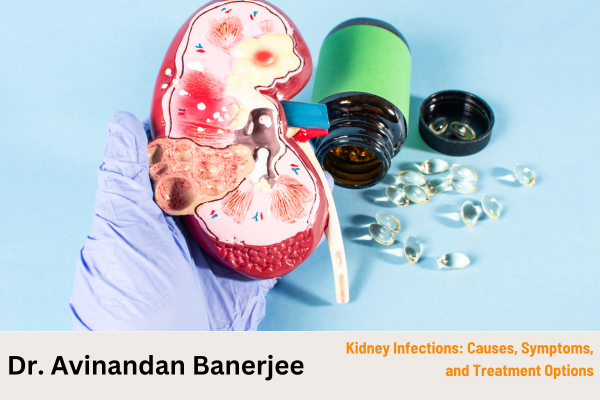Kidney Infections: Causes, Symptoms, and Treatment Options
Kidney infections, also known as pyelonephritis, are a serious type of urinary tract infection (UTI) that affects one or both kidneys. If left untreated, kidney infections can cause long-term damage to the kidneys. In this blog, we’ll dive into the causes, symptoms, and treatment options for kidney infections, helping you understand the risks and how to manage them effectively.
Dr. Avinandan Banerjee
3/11/20253 min read


What is a Kidney Infection?
A kidney infection, also known as pyelonephritis, is a type of urinary tract infection (UTI) that occurs when bacteria or other germs spread to the kidneys from the bladder or other parts of the urinary tract. Kidney infections can be severe and may lead to complications such as kidney damage or bloodstream infections if left untreated. Early detection and treatment are key to preventing long-term damage.
Causes of Kidney Infections
Kidney infections are most commonly caused by bacteria that travel up the urinary tract and into the kidneys. The most frequent culprit is Escherichia coli (E. coli), a bacterium that normally resides in the intestines but can enter the urinary tract through the urethra.
Factors that increase the risk of developing a kidney infection include:
Urinary tract infections (UTIs): UTIs that are left untreated can spread to the kidneys.
Obstructions in the urinary tract: Kidney stones or an enlarged prostate can block the flow of urine, increasing the risk of infection.
Weakened immune system: People with weakened immune systems, such as those with diabetes, HIV, or those undergoing chemotherapy, are more susceptible.
Pregnancy: Hormonal changes and the pressure of the growing uterus can make women more prone to urinary tract infections and kidney infections.
Indwelling urinary catheters: Using a catheter increases the risk of bacteria entering the urinary tract.
Symptoms of Kidney Infections
Common symptoms of kidney infections include:
Pain in the lower back or side: Pain or discomfort on one or both sides of the lower back, just below the ribs, is a hallmark of kidney infection.
Fever and chills: A high fever accompanied by chills often indicates an infection.
Frequent, painful urination: A burning sensation when urinating or a constant urge to urinate.
Cloudy or foul-smelling urine: Urine may appear cloudy or have a strong, unpleasant odor.
Nausea and vomiting: Kidney infections can cause digestive disturbances such as nausea or vomiting.
Fatigue: Feeling unusually tired or weak is common with any infection, including kidney infections.
How Are Kidney Infections Diagnosed?
To diagnose a kidney infection, a healthcare provider will typically perform a physical examination and ask about your symptoms and medical history. They may recommend the following tests:
Urinalysis: A urine sample can be tested to detect bacteria, white blood cells, or blood, which can confirm a kidney infection.
Urine culture: A urine sample is cultured to identify the specific bacteria causing the infection.
Imaging tests: In some cases, an ultrasound or CT scan may be ordered to check for complications, such as kidney stones or blockages.
Treatment for Kidney Infections
Kidney infections are generally treated with antibiotics. The specific antibiotic used will depend on the type of bacteria causing the infection. Treatment typically involves:
Oral antibiotics: For mild to moderate infections, oral antibiotics are often sufficient to clear the infection.
Intravenous (IV) antibiotics: In more severe cases, especially if the infection has spread or if the patient is unable to take oral medications, antibiotics may be administered intravenously in a hospital.
Hospitalization: People with severe kidney infections, particularly those who are very ill or have complications, may require hospitalization for treatment.
It is important to complete the full course of antibiotics, even if you start feeling better before the medication is finished, to ensure the infection is completely eradicated.
Prevention of Kidney Infections
While it’s not always possible to prevent kidney infections, there are steps you can take to reduce the risk:
Stay hydrated: Drink plenty of water to help flush bacteria out of the urinary system.
Urinate when you need to: Don’t hold in urine for long periods of time. Empty your bladder fully when you urinate.
Wipe front to back: This is particularly important for women to avoid transferring bacteria from the rectum to the urethra.
Avoid irritants: Stay away from products like douches, powders, and harsh soaps that can irritate the urinary tract.
Urinate after intercourse: This can help flush out bacteria that may have entered the urinary tract.
CONTACT US
For Appointment: +91 91637 18654
Mail Us: dravinandanbanerjee2024@gmail.com
Our Address:
Manipal Hospital, Kolkata
Ananda Clinic, Diamond Harbour Rd
Dr. Avinandan Banerjee
Dr. Avinandan Banerjee is a leading nephrologist with over 12 years of experience, providing expert kidney care with a compassionate approach.